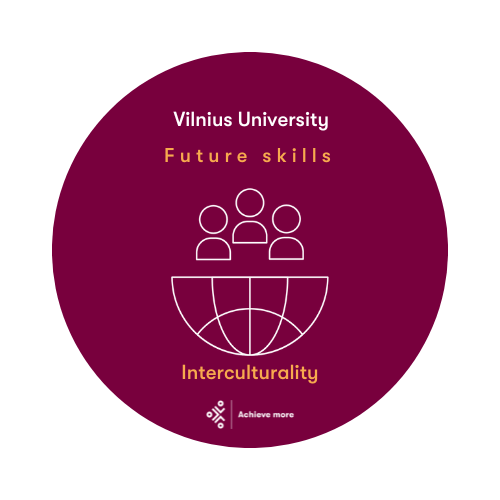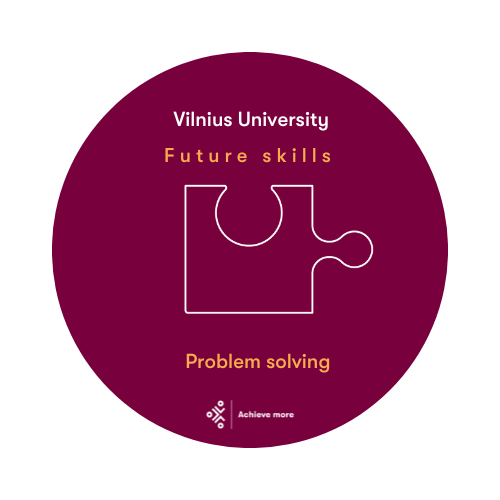"Achieve more" programme
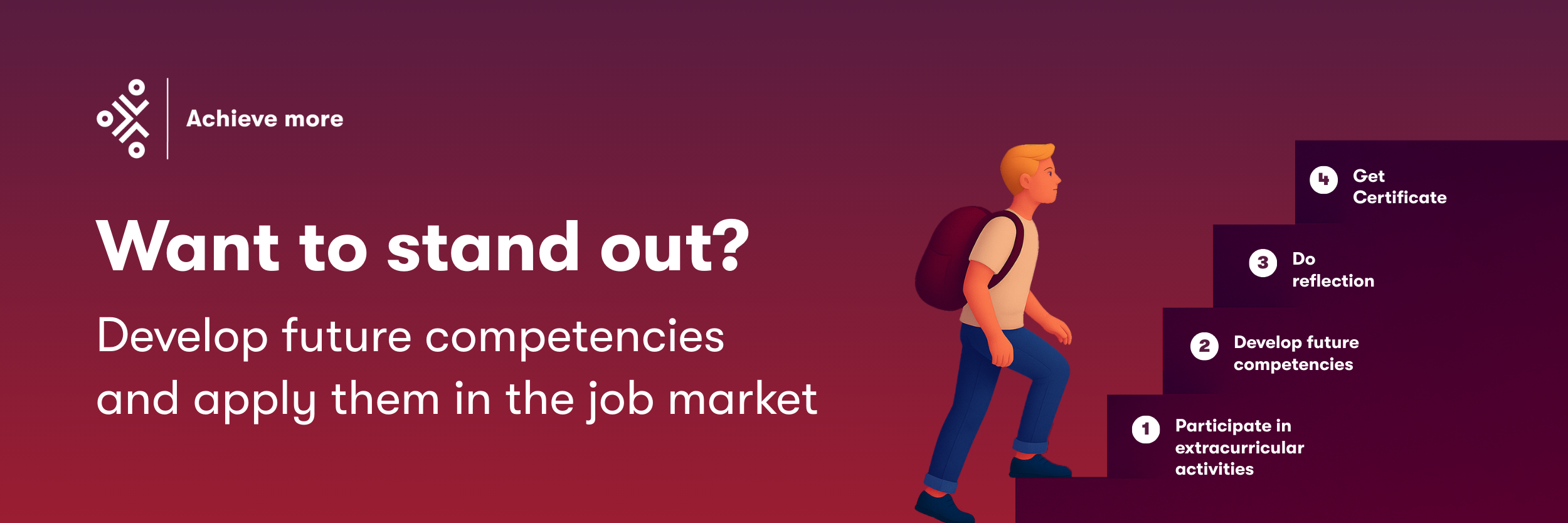
The "Achieve more" programme is an opportunity to develop future competencies and receive a certificate and VU LinkedIn Badge for the skills, knowledge, and attitudes you have gained by participating in extracurricular activities. Whether you are a member of the VU Student Representatives, a member of a sports team or a volunteer at VU, the goal is to recognise your contribution and personal development.
Why is it worth participating in Achieve more?
Would you like to participate in the "Achieve more" programme?
The "Achieve more" programme is an opportunity to develop future competencies and receive a certificate and VU LinkedIn Badge for the skills, knowledge, and experience you have gained by participating in extracurricular activities. Whether you are a member of the VU student representatives, a member of a sports team, or a volunteer at VU, the university's goal is to recognise your contribution and personal development.
How does this benefit you? Participation in the programme will help you:
🎯 Stand out from other candidates in the job market;
🎯 Supplement your resume (CV);
🎯 Get to know yourself and your competencies;
🎯 Perform better during job interviews.
The "Achieve more" programme runs every academic year from the 1st of October to the 1st of May, so if you missed out this year, try again next year!
How to participate in the programme?
- Register for the "Achieve more" programme.
- Receive an email invitation to join the e-learning course "Future Competencies." If you are unable to join the e-learning course, please contact us at
- In the e-learning course "Future Competencies," assess whether you are developing all 5 future competencies in your activities or select several activities that cover all 5 future competencies.
- In the e-learning course, assess your current level of competence and set personal goals.
- At the end of the activity or activities, or by 1st of May, if you have developed all 5 future competencies, perform a final reflection on each competency and assess whether you have achieved your goals.
- Take part in the "Achieve more" awards at the end of May, and if you have developed all 5 future competencies, apply for an award and receive a certificate, LinkedIn Badge, career consultation and other prizes.
Achieve more Awards
Participants who successfully complete the activities will be invited to the "Achieve more" awards ceremony.
Participants who have developed all 5 future competencies (in one or several activities) and completed a reflection through the „Achieve more“ programme will be awarded the following during the event:
- A certificate;
- A certified LinkedIn badge;
- An individual consultation with a career advisor on how to properly prepare a LinkedIn profile;
- The 5 students who submitted the best reflections will receive exclusive prizes.
VU Future competencies
Future competencies (or general competencies) are knowledge, abilities and attitudes that can be applied in different activities. They are developed both during the study process and in extracurricular university activities so that every VU graduate is prepared for an uncertain future, a constantly changing job market and a successful career path in the broader sense.
Vilnius University students, lecturers, graduates and social partners have identified the following five future competencies:
- collaboration;
- responsibility;
- interculturalism;
- problem solving;
- openness to change.
These competencies can also be developed informally:
- Through non-formal education, where activities focused on developing specific competencies (workshops, seminars, etc.) are organized.
- Through self-directed learning, where learning takes place during various activities, such as sports, art, volunteering, etc. Such learning can be both conscious and purposeful (when the learner understands that they are acquiring additional competencies and reinforces the development of those competencies in their activities) and unconscious (when the learner develops their competencies but does not recognize it).
Other important competencies closely related to the future competencies outlined above are reflection, critical thinking and creativity. All of these are an integral part of the learning process. Thus, each competency is developed through reflection, and its application is accompanied by critical thinking and creativity.
Collaboration
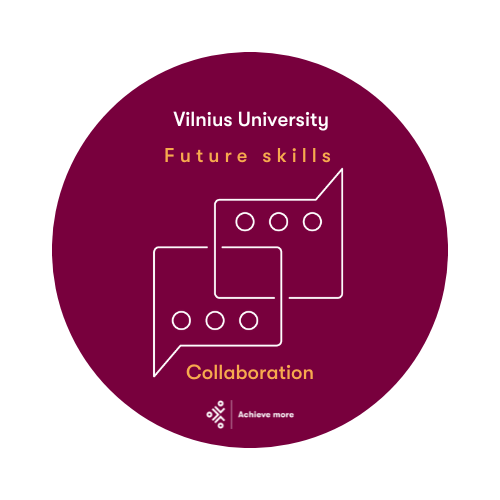 |
What is considered relevant competency
What is not considered relevant competency
|
Responsibility
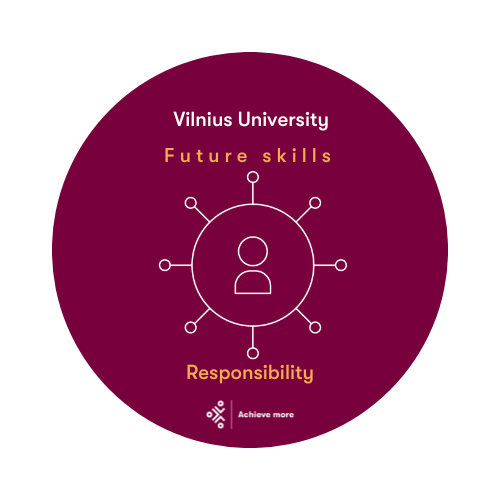 |
What is considered relevant competency
What is not considered relevant competency
|
Interculturalism
|
|
What is considered relevant competency
What is not considered relevant competency
|
Problem solving
|
|
What is considered relevant competency
|
Openness to change
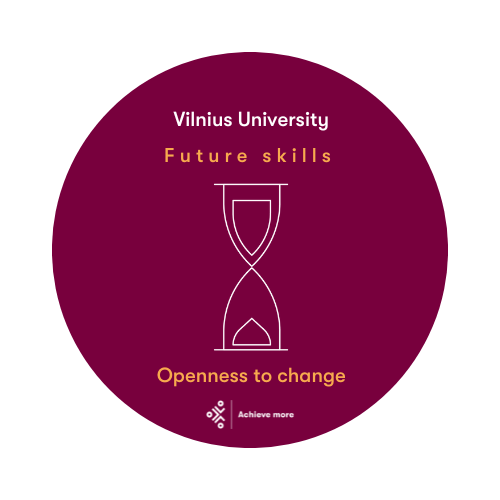 |
What is considered relevant competency
|
Self-reflection
If you want to present the knowledge and experience you have gained to your employer in the future, describe the experience you have gained and collect documents confirming it.
Self-reflection is based on a set of five questions designed to reveal each competence.
We recommend discussing these questions with the managers and/or career advisors involved in the activities you participate in.
Questions for weekly self-reflection
- What made this week special?
- What can I be happy about this week?
- What difficulties did I encounter this week?
- How did I feel this week?
- What did I learn this week?
- What would I like to learn in the future?
Questions for reflection on developing future competencies
Cooperation
- Think back to a time when you faced challenges while working in a team. How did you overcome these challenges and encourage team members to cooperate and support each other?
- Think about a collaborative project in which you played a leadership role. What strategies did you use to create a collaborative environment and ensure the team's success?
- Describe an experience in which you had to collaborate with individuals who had different ways of thinking and were not from your usual social or cultural environment. How did you use each team member's unique perspectives and strengths to achieve a common goal?
Accountability
- Think of a time when you were entrusted with an important task or responsibility. How did you prioritize your duties and ensure effective resource management to achieve the desired result?
- Share a situation where you took on a leadership role and demonstrated responsibility. How did you motivate and guide others toward a common goal?
- Describe a situation in which you took responsibility for a problem or challenge that was not assigned to you. How did your sense of responsibility motivate you to find a solution and contribute to the overall success?
Interculturality
- Think about an intercultural experience that had a significant impact on you. How did it broaden your understanding of different cultures and help you develop a more open-minded approach?
- Think about a situation where you encountered cultural misunderstandings or barriers. How did you overcome these challenges and promote effective communication and cooperation?
- Share an experience when you actively sought opportunities to learn about a culture different from your own. How did this experience improve your ability to work and communicate in diverse environments?
Problem solving
- Describe a situation in which you encountered a complex problem that required a unique solution. How did you approach the problem-solving process, and what creative strategies did you use?
- Think about a situation where you collaborated with others to solve a complex problem. How did your collective problem-solving efforts lead to a successful solution?
- Describe an experience where you faced a problem due to limited resources or constraints. How did you demonstrate resourcefulness and find innovative solutions to overcome these limitations?
Openness to change
- Think about a time when you embraced significant change or took a new approach to a situation. How did your openness to change lead to positive results or personal growth?
- Think about a situation where you challenged the status quo and proposed innovative ideas or solutions. How did your openness to change and creativity contribute to a positive impact?
- Describe an experience when you had to adapt to unexpected changes or disruptions. How did you demonstrate flexibility and resilience in transitioning to these changes?
